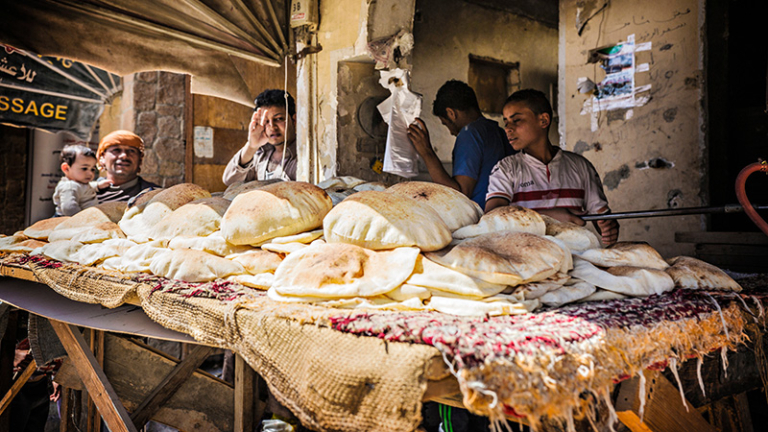
In response to rising oil and food prices, Egyptian President Abdel Fattah el-Sisi recently insinuated that Egyptians should “eat tree leaves” in order to survive under the country’s deteriorating economic conditions. Sisi’s remarks came amid soaring inflation, a shrinking middle class, and price hikes on subsidized goods, all of which have caused Egypt’s poor to increasingly struggle to access basic commodities. These conditions have been exacerbated by Russia’s invasion of Ukraine and a subsequent global wheat shortage, which has hit especially hard in Egypt, a country that imports the vast majority of its wheat supply from abroad.
Despite Sisi’s 2014 promise to revive the country’s economy, widespread inequality and a growing economic crisis are evidence of the fact that Egypt has effectively broken the social contract that has long existed between the state and its citizens. Egypt’s dire economic situation demands greater investment by the Sisi regime, especially in women and the poor, in order to reinvigorate its social contract. Egypt’s allies, particularly the United States, should also leverage their influence to condition economic assistance on the Sisi government reallocating a greater portion of aid toward social welfare programs.
A Pillar of the Social Contract
Given that Egypt is the world’s largest wheat importer, consumption of its staple bread product, eish baladi, has been severely threatened by both domestic and global policies. In addition to its outsized cultural significance in Egyptian cuisine, eish baladi is an important part of Egypt’s economy, and is also understood by many Egyptians as being symbolically central to the social contract between the state and the people. From its key role in the government of former Egyptian President Gamal Abdel Nasser’s socialist-nationalist regime, to the 1977 Bread Riots that erupted in response to former President Anwar al-Sadat’s attempt to remove bread subsidies, to the mass social movements that successfully toppled former President Hosni Mubarak in 2011, subsidized bread has long been central to Egyptians’ economic and political grievances, and has been an important indicator of the status of the government’s relationship with its citizens. Over 70 percent of Egyptians currently rely on the state’s subsidized bread program, so when the government fails to keep bread affordable for Egypt’s most vulnerable citizens—especially women and the poor, who have disproportionately borne the brunt of the country’s recent economic crisis and wheat shortage—this bond between the state and its citizens is broken.
Egypt’s Food Crisis
Although Russia’s invasion of Ukraine did not cause Egypt’s food crisis, the war’s disruption of global wheat supplies certainly exacerbated the government’s already extant inability to satisfy its citizens’ need for food staples. Together, Russia and Ukraine are the source of over 80 percent of Egypt’s imported wheat. In the first 100 days of Russia’s war in Ukraine, global wheat prices rose almost 60 percent, leading Egypt to diversify its wheat imports and explore purchasing from international tenders. And although wheat prices have since fallen, experts say that global supplies are still short and a global food crisis remains a real possibility.
Subsidized bread has long been central to Egyptians’ economic and political grievances.
To replenish its supply of wheat, the Egyptian state has relied on some of the most vulnerable sectors of its population. Although Egypt was able to secure a steady wheat supply in the first several months of the Ukraine war, by October 2022, the country could no longer meet rising demand for subsidized bread. While the country struggled to find replacement suppliers internationally, it increased its dependence on domestic producers, which led to financial difficulties for many of the country’s farmers and only slightly alleviated the burden of higher food prices from which poor Egyptians continue to suffer.
Women and the Poor
The Egyptian government’s willingness to exploit its often impoverished small farmers indicates that the social contract between the state and its rural agriculturalists is deteriorating. In the past year, the Sisi regime has issued a series of policies to both encourage and ultimately force domestic producers to sell their wheat to the government. In March 2022, the government raised the price at which it buys locally-grown wheat to encourage local farmers to increase the amount of wheat they sell to the state. The cabinet also announced that it would provide subsidized fertilizers to incentivize selling to the government. But the government-set price for the procurement of domestic wheat is still meager compared to what farmers could get if they sold to buyers in the private sector, a factor that keeps prices from ballooning out of control, but that also harms local producers.
The government-set price for the procurement of domestic wheat is meager compared to what farmers could get if they sold to the private sector.
The government also paired its incentivizing initiatives with more forceful measures, including banning exports and placing restrictions on wheat trade and on the commodity’s movement across provinces. The Egyptian Ministry of Supply and Internal Trade also issued a policy that requires farmers to supply a minimum of 60 percent of their crop to government buyers, which prevents domestic producers from selling to more profitable private sector buyers, and which in some cases cuts into the portion of wheat that farmers typically grow for their own families’ consumption. At least 41 farmers have been arrested for violating the law requiring them to sell their wheat to the government instead of selling it on the open market or keeping it for their own consumption.
Egyptian women have also faced an undue burden due to the country’s wheat shortage, one that compounds those they already face. Egyptian women living in rural areas are often required to work long hours in the fields and walk long distances to acquire food, water, and fuel, in addition to performing numerous household duties. And because their labor is essential to food purchasing and acquisition, women in rural Egypt are often forced to compensate for the government’s inability to satisfy food needs. They are thus burdened with the responsibility of rationing resources and managing domestic budgets in order to produce enough food at home.
Although breadmaking continues in Egypt’s rural areas, the advent of state-run bakeries in the 20th century helped to liberate urban women from this time-consuming domestic responsibility. Access to cheap, subsidized bread is one of many factors that have allowed urban women to enter the workforce and earn additional income. But wheat shortages in Egypt have historically resulted in lengthy bread lines at urban bakeries, which means that the current wheat crisis will likely result in Egyptian women and girls being forced to spend extra hours acquiring food for their families, leading them to neglect their education or harming their ability to participate in the country’s workforce.
Despite women and girls’ outsized role in both the production and acquisition of bread in Egypt, women and children continue to experience higher rates of malnutrition, and are often expected to eat less in order to provide greater sustenance for men and boys. One woman participating in Egypt’s subsidized food program, for example, said that she has resorted to drinking water to curb her hunger, saving food for her children instead. With a staple as important as wheat now in short supply, Egypt’s women are more likely than ever to go hungry as they bear the brunt of the crisis. This situation is especially dire for nursing mothers since access to subsidized bread, which is enriched with iron and folate, is of critical importance to the health and nutrition of both mothers and infants. The current crisis thus has the potential to negatively affect future generations as well as current ones.
The Social Contract Can Help Reduce Inequality
In recent years, as the Egyptian state has tried to reduce the cost of its subsidy programs, it has reduced the size of subsidized bread loaves. Meanwhile, some officials have suggested ways to more efficiently utilize vital commodities, including by preventing wheat from being used for the production of sweets in bakeries and as animal feed. Although undertaking these policies would increase the supply of subsidized bread, eradicating underlying economic inequality warrants reforms that reach beyond the country’s bakeries.
Egypt has made significant cuts to fuel and electricity subsidies to satisfy conditions mandated by the IMF.
Although over two-thirds of Egypt’s population struggle to obtain basic commodities, instead of bolstering its subsidy program, the state has made significant cuts to fuel and electricity subsidies in recent years to satisfy conditions mandated by the International Monetary Fund—from which Egypt has borrowed extensively in recent years—and has also continued to funnel large amounts of money into infrastructure development, largely in the form of megaprojects that have provided little value for the country’s citizens. Egypt’s Central Bank has also undertaken multiple currency devaluations in order to satisfy IMF loan conditions, causing citizen’s savings to sharply decrease in value and leading to higher inflation rates.
Although the Sisi regime has given no indication that it will pause its megaprojects, its continued reliance on the IMF to sustain its investments in infrastructure will further exacerbate the poor conditions in which most Egyptians live. Rather than allowing the Sisi regime to funnel massive amounts of money into the private and military economic sectors and demanding that it reduce the funds it allocates to food, energy, and fuel subsidies, the IMF should promote reforms that emphasize growth and increase government revenue, but without harming the poor. In 2016, for example, the government successfully reduced the public deficit by raising the VAT tax rate, which exempted basic goods and services to help protect the country’s poor. Similar proposals to enforce capital gains and exchange transaction taxes could also be viable avenues for increasing revenue so that the Egyptian state can better finance social welfare programs without straining the national budget.
As one of Egypt’s closest allies, the United States should also take more aggressive action to pressure the Sisi government to pursue reforms that allow Egypt to continue investing in social welfare. The United States’ support for IMF loans to Egypt must be accompanied by the realization that the rapid removal of subsidies and increased privatization drives, such as the one that Egypt is currently undertaking, will cause great harm to the vast majority of the Egyptian people. Furthermore, the Biden administration’s support for such initiatives will undoubtedly damage US credibility in Egypt, which has already been undermined by its tepid response to Egypt’s gross human rights violations. Meanwhile, if the Sisi regime continues to neglect its most vulnerable citizens, the state will further undermine its already shaky legitimacy. And if Egypt’s revolutionary past is any indication, the Egyptian people will not abide any further deterioration of the social contract.
The views expressed in this publication are the author’s own and do not necessarily reflect the position of Arab Center Washington DC, its staff, or its Board of Directors.
Featured image credit: Shutterstock/Natalia Milko

